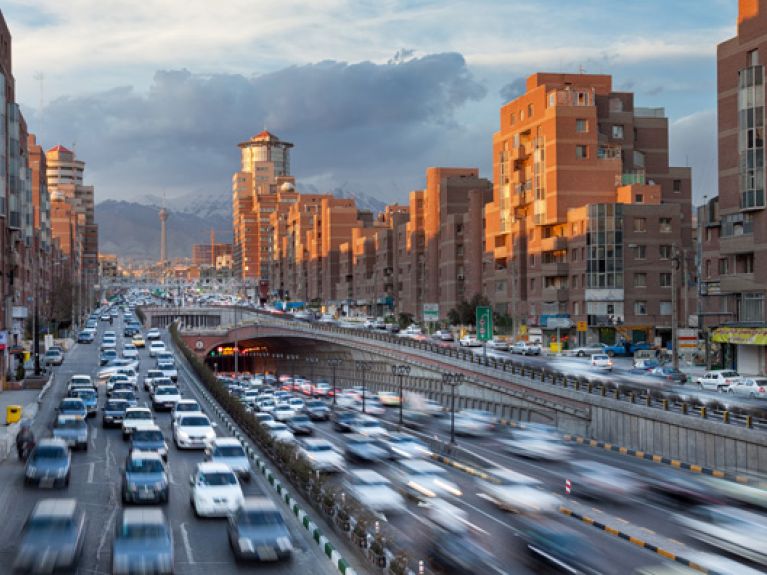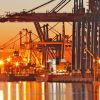Back on the world market
The easing of nuclear sanctions has made Iran the wild card in the global economy. Many German companies are offering the country economic partnership.

At the car plant, a Mercedes Sprinter is just coming off the production line. The robots on the shop floor were supplied by German company Kuka, the mixing cylinders by Reinhardt-Technik from Germany’s Sauerland region. The sheet metal presses were made by Schuler, one of the many world market leaders from the German federal state of Baden-Württemberg. That the car plant using all these machines lies 4,000 kilometres south-east of Germany – in Iran’s capital Tehran – in no way diminishes the value placed on the precision and reliability of the machinery imported from so far away. “You can’t beat German presses,” the manager enthuses as he shows his guests around the Iran Khodro plant.
The powerful state-owned company has long been the go-to partner for car manufacturers and parts suppliers from the West who wish to gain a foothold in Iran. After all, Iran’s automobile production – spearheaded by Iran Khodro – occupies a leading position throughout the Middle East. Since the sanctions imposed on the country in 2006 were lifted in January 2016, Iran has been considered the wild card in the global economy. Thanks to its location on major trade routes, the country – which is over four times the size of Germany –occupies a key position, not only in terms of economic geography. What’s more, its abundant oil and gas resources make it immensely rich.
Optimistic mood
But the country’s infrastructure is chronically outdated – the consequence of wars and decades of political isolation. The approximately 80 million Iranians have a lot to catch up on when it comes to cosmopolitanism and consumption. The result: today, Iran’s per capita GDP is not even one-eighth of Germany’s. It’s not only Iranians that are now hoping for the start of a swift economic comeback, the mood is optimistic in many European foreign trade offices as well. The current Iranian government of President Hassan Rouhani is looking to award projects worth some 200 billion US dollars, and according to World Bank estimates Iran’s economic output is expected to grow by five per cent. Across the country, there are plans to build factories and refineries, power plants and power supply lines, roads and underground railways.
Germany’s foreign-trade agency Germany Trade & Invest (GTAI) has conducted an analysis indicating which sectors can be especially hopeful about doing future business in Iran. It found that the oil, gas and chemical industries as well as the closely connected energy sector are particularly well-positioned here. The idea behind this is quite plausible: if Iran is to extract and refine its vast mineral resources – the country has the world’s largest proven natural gas reserves and ranks fourth among the countries with the largest oil reserves, after Venezuela, Saudi Arabia and Canada – that will require massive investments.
Preferred partner
German engineering companies also have reason to believe they are in the running, given the Iranian government’s desire to bring up to date the technology used by domestic manufacturers with the help of Western partners. Up to the middle of the past decade, German companies were the leaders here, supplying nearly one-third of the machinery imported into the country. But they have since been forced to cede the lead to competitors from China.
Is everything now really going to change so quickly? Will Germany play a prominent part in the country’s modernisation? In the eyes of many Iranians, Germany is the preferred economic partner. The reasons for that go back far into the past. As early as the 19th century, the two countries were united in their power-political opposition to Britain’s colonial empire. In 1873, what was then Persia and the German Empire concluded their first trade treaty, which encouraged economic exchange and German investment on the Persian Gulf. Conversely, many Iranians soon came to study at German universities, especially engineering subjects. The German-Iranian Vocational School, which was established in Tehran in 1925, is still regarded as the seedbed of Iranian industry. Relations flourished again after the Second World War, a financial and symbolic high point coming in 1974, when Iran acquired a 25 per cent stake in the iconic German company Krupp, which needed the capital injection to survive. The 1979 Islamic Revolution and the war with Iraq in the 1980s subsequently made it more difficult to do business there. Nevertheless, Germany long remained Iran’s principal trading partner, with annual exports worth more than four billion euros.
Fragile trust
It was only in 2009 that China displaced Germany from this position. That was when the European Union decided to tighten the sanctions imposed in 2006. In particular the ban on financial transactions with Iran caused the volume of German exports to shrink to less than half the previous level practically overnight.
Today, the question of financing is a decisive factor in how quickly European and German foreign trade with Iran can gain traction again. That the United States doesn’t yet really trust political change in Iran is amply evidenced by the so-called snap-back clauses in the provisions facilitating economic relations: some of the sanctions are only being suspended, not lifted, and can be very quickly reactivated if the accord is violated. In that case – and this is something equally worrying to the car plant manager and the minister beckoning with contracts worth billions – the optimistic mood in the country could end just as quickly as it began.
German Iranians with a passion for start-ups
The “Iranian Modernity” cultural programme
“There is very great interest”
© www.deutschland.de

